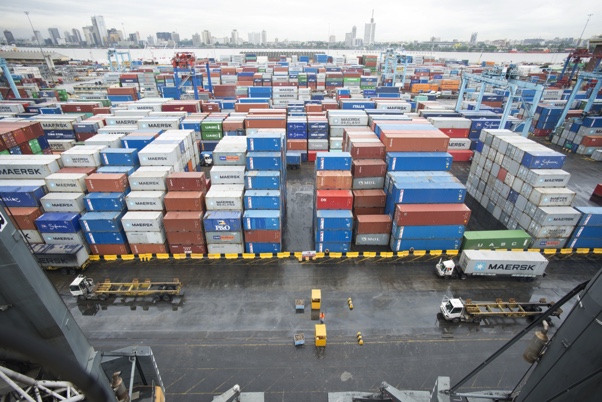
Nigeria’s largest container terminal, APM Terminals Apapa handled a little above 8.1 million twenty equivalent units (TEU) of containers in the past 15 years.
Terminal Manager of APM Terminals Apapa, Steen Knudsen, said container volumes at the terminal have increased by an average of 23 percent annually over the past five years.
“We handled 8,134,847 TEUs of containers since 2006 and more than 650,000 TEUs per year in 2020 and 2021 – the majority of that being import volume. Over the last years we have managed to grow the business extensively – by 23 percent per annum on average. We are continuously making our terminal operations more efficient,” he said.
“While there is a compelling need to reduce the dwell time of containers at the terminal, there are several factors – most of them beyond the control of a terminal operator – that make it possible for consignees to keep their containers at the terminal for a long period of time.
“As a terminal, we are interested in ensuring that dwell time remains as low as possible. However, there are processes in place that we are not in direct control of. These include customs clearing processes and related processes of other government agencies such as the National Drug Law Enforcement Agency (NDLEA), Standards Organisation of Nigeria (SON), National Agency for Food and Drugs Administration and Control (NAFDAC) and so on. These agencies all have to approve the movement of cargo out of the port. The more in harmony this process can work, the faster the cargo can move through the terminal and hence reduce cost for the importers.
“Another very relevant factor at the moment in terms of cargo flow is the foreign exchange rate to the US dollar, which is starting to hurt the Nigerian importers, and cargo seems to be slowing down simply because warehouses are getting full. Hence it is more likely that the container will stand in the seaport for a longer time,” Mr. Knudsen said.
He said the strategy of APM Terminals Apapa is to be the preferred logistics gateway into the Nigerian economy, and in doing so – to provide world-class services.
“World-class services mean the shipping lines that come in get a consistent and cost-efficient product, i.e. that we handle their vessels fast, hence translating into a reduced cost of import and export in the market.
“For the Nigerian importers and exporters, it would mean that our efficiency on the waterfront allows us to be also cost-efficient in terms of facilitating their trade back into the market.
“Another element of strategy is, of course, continuous building and strengthening our operations in Nigeria. APM Terminals is a global company, and as such we bring in international practices and best standards when it comes to facilitating the international flow and international trade into the market. And it is also important for the terminal to continuously focus on customer-centricity and on creating a consistent and safe environment for our employees.
“Customer centricity is not just about shipping lines, but also about internal customers to ensure that all the processes are consistent and efficient for facilitating their trades. For our employees, it means we are the preferred employer; that we continuously offer the best facilities and safe operations so that they have long-term employment with us, can develop themselves and go home safely at the end of the day,” he said.
APM Terminals Apapa is the largest container terminal in West Africa. With an investment of over USD438 million in equipment, facilities and other elements of its operations over the last 15 years; the terminal has continued to introduce new innovations to help both shipping lines and landside customers achieve improved supply chain efficiency and flexibility in a cost-effective manner.